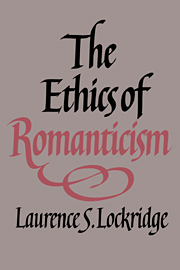Introduction
Published online by Cambridge University Press: 16 September 2009
Summary
The British Romantics are rarely accused of immoderate virtue. From their day to ours, the attention they have commanded has been tinged with fascinated disapproval. Coleridge's and De Quincey's opium-eating and intellectual thefts, Byron's sexual plasticity and Hazlitt's crazed courtship of his landlord's daughter, and Shelley's implication in scandal and death, come to mind so readily as to inform our larger concepts of each, despite our abstention from easy and irrelevant censure. Even the better behaved among them invite the kind of gossip we customarily relegate to the borders of literary criticism. Wordsworth's love affair with Annette Vallon and attachment to his sister Dorothy subtly sexualize the poetry in our minds. We may have been disappointed to learn, in recently discovered correspondence, that passion for his wife exceeded passion for his sister. Biographers debate which one Keats was more likely to have had – syphilis or gonorrhea – reminding us in a literal pathogenetic way of the painful fusion of disease and desire in his art. This leaves only Blake – in his poetry the most vigorous immoralist, and regarded by some of his contemporaries as mad and seditious – leading a virtuous life of modest means, marital fidelity, and hard work.
No other group of authors in British literature has been so subjected to moral adjudication. From their contemporaries in the reviews to the Victorians to the New Humanists and beyond, their critics have invoked moral criteria in judging them delinquent or exemplary, shallow or profound.
- Type
- Chapter
- Information
- The Ethics of Romanticism , pp. 1 - 10Publisher: Cambridge University PressPrint publication year: 1989

